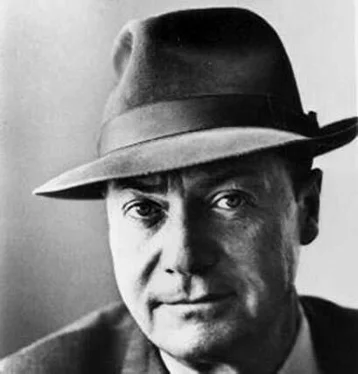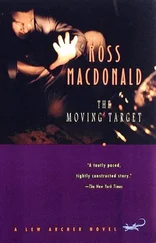In the first sorrowful, self-pitying months of his separation, Lew spent many alcohol-soaked nights in bars, including the Gilded Galleon, a nautical-motif saloon on his old home turf of Long Beach, far from the Hollywood rat race.
But during the days, Archer threw himself wholeheartedly into the Hollywood whirl. With a mixture of melancholy, bitterness, and ambition, the young Archer did what the older Archer would continue to do for different reasons: he lost himself in his work.
That labor often began with a client meeting in Archer’s second-floor office in a stucco building at 8411½ Sunset Boulevard. “I don’t spend money on front,” [46] The Drowning Pool.
Archer warned. His office was nothing much to see.
Up one flight of stairs and down a “rather dingy” corridor, next to a modeling agency catering to a couple generations of “aspiring hopeless girls,” was the door marked “Lew Archer: Private Investigator.”
Inside was a small waiting-room containing a sagging green imitation-leather davenport, a matching green armchair, and a settee too short to stretch out on (though, when exhausted, Lew sometimes napped awkwardly on it, his legs hung over its wooden arm). There was also a wall clock, a table, and a table lamp – with the latter, unbeknownst to visitors, containing a built-in microphone wired to a pair of metal earphones in the next room.
Beyond a door marked “Private” – a door with a panel of translucent one-way glass, through which Archer could view anyone who entered his waiting room – was the inner office, a sanctum only big enough for three chairs: a soft armchair by the window, a straight chair against a partition, and the swivel chair in which Archer sat behind a plain wooden desk with an unpolished top. On the desk were a telephone, a lamp, and a pen set. Out of sight in the desk’s upper right-hand drawer was a .32 automatic.
There was a dented olive-drab filing cabinet, a water cooler, a liquor cabinet, a closet (which held a clean shirt) and a safe. The walls displayed framed mug shots of “killers, embezzlers, bigamists and con men” – hard cases “with unabashed eyes” and “faces you see in bad dreams and too often on waking.” [47] The Zebra-Striped Hearse.
Visitors competed with the sounds of automobile traffic on the boulevard below. A window with slatted Venetian blinds gave a view of the Sunset Strip’s passing parade: “a bright young crowd of guys and girls buzzing and fluttering in pursuit of happiness and the dollar.” [48] Ross Macdonald, The Ivory Grin (Knopf, 1952).
As a member of that aspiring postwar crowd, Lew Archer – from both professional need and personal vanity – presented a good appearance. Over six feet tall and weighing 190, with a muscular build, dark hair, and blue-gray eyes, he was handsome in a rugged manner, not unlike such movie actors as Paul Newman and (later) Steve McQueen. (“You’re kind of cute,” one ’50s female told him, “in an ugly way, you know.” [49] “The Angry Man”.
) He wore clothes well and didn’t mind spending for quality. He had a couple of expensive charcoal-gray suits (worn with a fedora, until hats went out) and an assortment of sports clothes from such fashionable men’s shops as Sy Devore. He favored Scotch walking shoes with iron-shod heels. Throughout the 1940s and ’50s, he often carried a holstered .38 special beneath his jacket.
When not worn, that or another gun was locked in the dashboard compartment of his car. The car’s trunk held a locked steel evidence case, secure transport for anything from a cache of seized marijuana to an unearthed skeleton. Also in the car were a briefcase (sometimes carried for show) and a contact microphone useful in overhearing conversations.
Right after the war, Archer bought a sharp-looking light-blue convertible, which he loved like a rider loves his horse. When that car was stolen, then wrecked, Lew got another convertible.
Archer the former hot-rodder fancied he could judge people’s personalities in this car-crazy town by the vehicles they drove, and vice versa. “If I had been asked to guess what kind of car [a certain flamboyant and reckless actor] had,” Lew related in 1951, “I would have said a red or yellow convertible, Chrysler or Buick or De Soto. It was a yellow Buick with red leather seats.” [50] The Way Some People Die.
Archer’s own lighter Ford convertible was less showy and more sporty – embodying his own fantasies of conservative glamour, self-sufficiency, and speed: he knew for a fact the Ford had enough juice to “hit the peg” at 100 mph if he needed it to. [51] Find a Victim.
By the late 1950s, Lew was driving a green Ford convertible. It too was stolen, then recovered – two years in a row. After that, Archer bought cars less often and kept them longer, while staying loyal to Fords.
He ran a one-man agency. It was cheaper that way, but Lew had other reasons for not hiring assistants: “The squares want security, and the hipsters want a chance to push people around at fifty dollars a day. Neither of which I can give them.”
When necessary, Archer co-opted the help of other private detectives in L.A., San Francisco, or Reno. Some of these ops (Willie Mackey, in the Bay Area; the married Nevada couple, Arnie and Phyllis Walters) became, to some degree, personal friends.
Archer had other professional contacts and colleagues of whom he was more or less fond, including Morris Cramm, legman for a nightlife-columnist; the art critic Manny Meyer; the screenwriter Sammy Swift; the switchboard women at his answering service (with whom he was on a first-name basis); and Hollywood agent Joey Sylvester.
The more Archer moved in Hollywood circles, though – eating at Musso’s, frequenting clubs on the Strip – the less he liked a place and an industry and a state of mind based on meaningless dreams invented for money. He came to feel that evil “hung in [movie] studio air like an odorless gas.” [52] The Moving Target.
Archer was a fan of reality, no matter how hard to take. The movie world was a fake from top to bottom; and the fakery, especially when it paid well, was corrupting. As Sammy Swift said, “I used to have talent. I didn’t know what it was worth. I came out here for the kicks, going along with the gag – seven fifty a week for playing word games. Then it turns out that it isn’t a gag. It’s for keeps, it’s your life, the only one you’ve got. And…you’re not inner-directed any more. You’re not yourself.” [53] The Barbarous Coast.
Lew Archer struggled to become and remain “himself” in this problematic Southern California milieu. It wasn’t always easy.
Archer didn’t like actors, for instance – didn’t trust their easy way of shifting in and out of alternate realities. But Lew himself had a talent to dissemble, and often he would represent himself as something other than a private investigator. He might say he was an insurance claims adjuster, or a newspaperman, or a freelance reporter for true-crime magazines, or a Hollywood literary agent, or a counselor, or a security man, or a car salesman. If someone wanted to mistake Lew for a policeman, even an undercover cop, he often let them. Once, spooked by a visitor to his office, he denied he was Archer at all and claimed to be Archer’s bookkeeper.
There were other ways to glide around the truth and avoid “the lie direct.” Asked what he did for a living, Archer might answer: “I have an office on Sunset Boulevard in Hollywood,” [54] Ross Macdonald, The Galton Case (Knopf, 1959).
or, “I run a small agency in Hollywood,” [55] The Chill.
or, “I represent musicians from time to time. I have an office on the Strip.” [56] The Far Side of the Dollar.
Читать дальше












